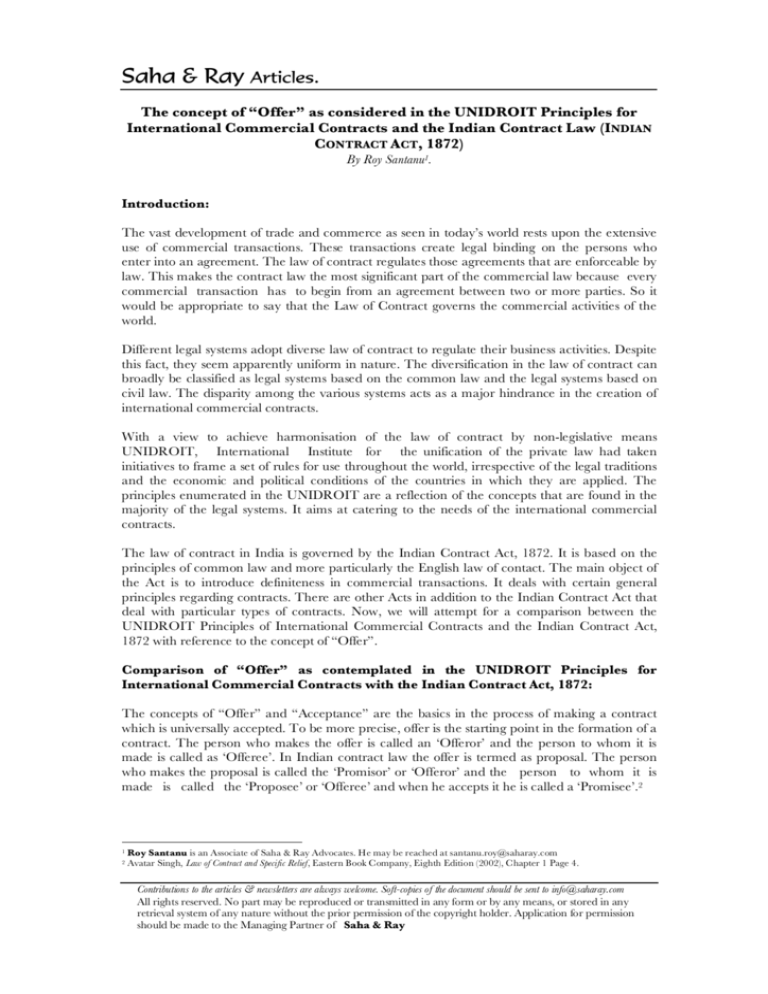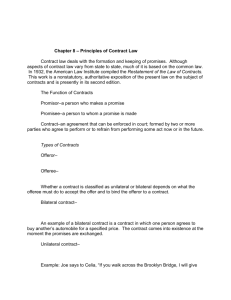
Saha & Ray
Articles.
The concept of “Offer” as considered in the UNIDROIT Principles for
International Commercial Contracts and the Indian Contract Law (INDIAN
CONTRACT A CT, 1872)
By Roy Santanu1.
Introduction:
The vast development of trade and commerce as seen in today’s world rests upon the extensive
use of commercial transactions. These transactions create legal binding on the persons who
enter into an agreement. The law of contract regulates those agreements that are enforceable by
law. This makes the contract law the most significant part of the commercial law because every
commercial transaction has to begin from an agreement between two or more parties. So it
would be appropriate to say that the Law of Contract governs the commercial activities of the
world.
Different legal systems adopt diverse law of contract to regulate their business activities. Despite
this fact, they seem apparently uniform in nature. The diversification in the law of contract can
broadly be classified as legal systems based on the common law and the legal systems based on
civil law. The disparity among the various systems acts as a major hindrance in the creation of
international commercial contracts.
With a view to achieve harmonisation of the law of contract by non-legislative means
UNIDROIT, International Institute for the unification of the private law had taken
initiatives to frame a set of rules for use throughout the world, irrespective of the legal traditions
and the economic and political conditions of the countries in which they are applied. The
principles enumerated in the UNIDROIT are a reflection of the concepts that are found in the
majority of the legal systems. It aims at catering to the needs of the international commercial
contracts.
The law of contract in India is governed by the Indian Contract Act, 1872. It is based on the
principles of common law and more particularly the English law of contact. The main object of
the Act is to introduce definiteness in commercial transactions. It deals with certain general
principles regarding contracts. There are other Acts in addition to the Indian Contract Act that
deal with particular types of contracts. Now, we will attempt for a comparison between the
UNIDROIT Principles of International Commercial Contracts and the Indian Contract Act,
1872 with reference to the concept of “Offer”.
Comparison of “Offer” as contemplated in the UNIDROIT Principles for
International Commercial Contracts with the Indian Contract Act, 1872:
The concepts of “Offer” and “Acceptance” are the basics in the process of making a contract
which is universally accepted. To be more precise, offer is the starting point in the formation of a
contract. The person who makes the offer is called an ‘Offeror’ and the person to whom it is
made is called as ‘Offeree’. In Indian contract law the offer is termed as proposal. The person
who makes the proposal is called the ‘Promisor’ or ‘Offeror’ and the person to whom it is
made is called the ‘Proposee’ or ‘Offeree’ and when he accepts it he is called a ‘Promisee’.2
1
2
Roy Santanu is an Associate of Saha & Ray Advocates. He may be reached at santanu.roy@saharay.com
Avatar Singh, Law of Contract and Specific Relief, Eastern Book Company, Eighth Edition (2002), Chapter 1 Page 4.
Contributions to the articles & newsletters are always welcome. Soft-copies of the document should be sent to info@saharay.com
All rights reserved. No part may be reproduced or transmitted in any form or by any means, or stored in any
retrieval system of any nature without the prior permission of the copyright holder. Application for permission
should be made to the Managing Partner of Saha & Ray
Saha & Ray
Articles.
A proposal for concluding a contract constitutes an offer if it is sufficiently definite and indicates the intention of the
offeror to be bound in case of acceptance.3
In a similar manner, the definition of offer as rendered by the Indian Contract Act would be
necessary in order to facilitate us for an easy
comparison. Section 2(a) defines “Offer” as follows; When one person signifies to another his willingness
to do or abstain from doing anything, with a view to obtaining the assent of that other to such act or abstinence, he
is said to make a proposal.
The definition provided by Article 2.2 of UNIDROIT principles points out that an offer must;
(1) Be sufficiently definite to permit the conclusion of the contract by mere acceptance and (2) Indicate the intention
of the offeror to be bound in case of acceptance.4 On the other hand, in view of the definition expressed
in the Indian Contract Act, a proposal is in the first place an expression of the offeror’s
willingness to do or abstain from doing something. Secondly, it should be made with a view to
obtaining the assent of the offeree to the proposed act or abstinence.5
The first and foremost essential as stated by UNIDROIT principle is that an offer to be valid
must be definite and certain. To be definite means the offer must be expressed in detail with full
clarity without an ambiguity. It cannot always be seen from the language used that the offer is
indefinite and uncertain. This is because sometimes an offer may not contain all the terms of the
agreement, but still it can be construed from the practices or usages established between the
parties. The Indian law is also identical in its requirement of definiteness as the primary essential
of an offer.
Further, we see that the UNIDROIT principles insist on a contractual intention by the offeror
while making a proposal. In other words, when there is no contractual intention on the part of
the offeror then he is not bound by the acceptance of the offeree which will never result in a
contract. In contrast, the Indian law is silent with regard to the fact whether a contractual
intention is necessary for a valid offer. Under the English law, an offer is valid only if it is made
with a contractual intention. A leading authority on this subject is the case of Balfour v. Balfour6
in which Lord Atkin commented, There are agreements between parties which do not result in contract
within the meaning of that term in our law. … They are not contracts because parties did not intend that they shall
be attended by legal consequences.7 As the Indian law is a derivation of the English law, the same rule
is applied in all cases. The intention of the offeror is normally ascertained from the terms
of the offer and the surrounding circumstances.
A careful analysis of the essential of contractual intention for a valid offer as put forth shows that
a distinction is to be drawn between offer and an invitation to offer. Invitation to an offer
lacks the intention of the offeror to bind by the contract even after an acceptance is made by the
offeree. It can otherwise be described as offers to receive or offers to negotiate. A distinction
between offer and invitation to offer is also dealt by the Indian Contract Act in a similar fashion.
The dividing line between them is very thin and minute.
The second comment to Article 2.2 of the UNIDROIT states that …a proposal addressed to one or
more specific persons is more likely to be intended as an offer than is one made to the pubic at large. The
statement makes it evident that offers made to the public at large or general offers are valid.
UNIDROIT Principles Article 2.2
UNIDROIT, Principles of International Commercial Contracts, International Institute for Unification of Private Law (1994), Chapter 2,
Page 27.
5 Avatar Singh, Supra note. 2.
6 (1919) 2 KB [Kings’ Bench] 571.
7 ibid. pages 578-579, also see Avatar Singh, Law of Contract and Specific Relief, Eastern Book Company, Eighth Edition (2002), Chapter 1
Page 9.
3
4
Contributions to the articles & newsletters are always welcome. Soft-copies of the document should be sent to info@saharay.com
All rights reserved. No part may be reproduced or transmitted in any form or by any means, or stored in any
retrieval system of any nature without the prior permission of the copyright holder. Application for permission
should be made to the Managing Partner of Saha & Ray
Saha & Ray
Articles.
However, it lays more emphasis on a specific offer which is addressed to one or more specific
persons rather than a general offer. The Indian law recognises the validity of a general offer.
The principle is derived from the famous case of Carlill v. Carbolic Smoke Ball Company8 where
Bowen L. J. remarked, It is an offer to become liable to anyone who, before it is retracted, performs the
conditions and although the offer is made to the world, the contract is made with that limited portion of the public
who come forward and perform the condition on the faith of the advertisement.9 This ruling was followed in a
number of Indian cases upholding the validity of the general offers.
Article 2.3(1) of the UNIDROIT principles deal with the communication of offer. An offer
becomes valid only when it is communicated to the offeree. The Indian law treats this
requirement similarly adducing great importance for communication. Until the offer reaches or
comes to the knowledge of the offeree the communication is incomplete. The communication of
offer can be oral or written.
Whatever the mode of communication, the offer must reach the offeree. Article 2.3(2) of the
UNIDROIT, points that an offer can be withdrawn by the offeror at any time before the
communication of offer reaches the offeree. Withdrawal of offer is the liberty given to the
offeror, to alter the terms of the offer or replace a new one in place of the old offer, provided
before the original offer reaches the offeree. The Indian contract law generally does not
recognise withdrawal except in case of a tender or standing offer where mere approval or
acceptance will not create any binding contract. Referring to a tender the Supreme
Court of India has observed that As soon as an order was placed a contract arose and until then there was
no contract.10 Therefore, a person who submits a tender can withdraw his tender before its final
acceptance, as held in the case of Rajendra Kumar v. State of M.P.11
Revocation of an offer and the exceptional situations in which it can irrevocable are dealt under
Article 2.4 of the UNIDROIT principles. An article 2.4(1) state that an offeror can revoke the
offer before it is accepted by the offeree. In other words, a revocation of offer is valid only if it is
made before a letter of acceptance is dispatched by the offeree.
Article 2.4(1) focuses on the exceptions to the rule of revocability. When the offeror makes an
indication expressly or impliedly that the offer is revocable then it cannot be revoked. On the
contrary, under the Indian contract law even if there is an express intention that an offer will not
be revoked without the consent of the offeree, it can be revoked without the offeree’s consent but
before the offer is accepted by the offeree.
According to Article 2.4(2) when the offeree genuinely believes that the offer is irrevocable and
acts upon the contract, then it cannot be revoked. Otherwise, if the conduct of the offeror or
nature of the offer influences the offeree, whereby he starts to perform his part of the obligations,
thereafter a revocation is impossible. It is based on the principles of good faith and fair dealing.
In contrast, the Indian contract law does not adhere to the rule of irrevocability of offers as it
based on common law, which is against the above mentioned rule.
Article 2.5 of the UNIDROIT principles states that there will be a termination of offer when the
offeree rejects the offer either expressly or impliedly. A rejection is implied when the offeree
instead of accepting the offer unconditionally desires some modifications or alterations, in the
terms of the offer for its acceptance. This can also be seen as a counter offer which in turn leads
(1893) 1 QB [Queens’ Bench] 256, also see Avatar Singh, Law of Contract and Specific Relief, Eastern Book Company, Eighth Edition
(2002), Chapter 1, Page 14.
9 Avatar Singh, Supra note. 2, Page 15.
10 Avatar Singh, Supra note. 2, Chapter 2, Page 39.
11 AIR (1972) MP 131, also see Avatar Singh, Law of Contract and Specific Relief, Eastern Book Company, Eighth Edition (2002), Chapter
2 Page 39.
8
Contributions to the articles & newsletters are always welcome. Soft-copies of the document should be sent to info@saharay.com
All rights reserved. No part may be reproduced or transmitted in any form or by any means, or stored in any
retrieval system of any nature without the prior permission of the copyright holder. Application for permission
should be made to the Managing Partner of Saha & Ray
Saha & Ray
Articles.
to the rejection of offer resulting in a termination. The Indian contract law treats the rejection of
offer as one of the causes of lapse or termination similar to the UNIDROIT principles.
When there is a stipulation of time, then the offeree is expected to make the acceptance within
such time, otherwise the offer will be deemed to be revoked. It is dealt in Article 2.7 of the
UNIDROIT. In case of an oral offer it must be accepted immediately unless there are other
circumstances which indicate for the survival. With reference to written offers the offeree must
make acceptance within the stipulated time as indicated in the offer. On the other hand, if no
time limit is
mentioned in the offer then acceptance must be made within a reasonable time, which varies
depending upon the nature and subject matter of the contract. The non adherence to the time
stipulation for accepting the offer results in termination, which is the same position in Indian
contract law.
Article 2.9(1) of UNIDROIT principles deals with a situation where a late acceptance by the
offeree, in the case of non stipulation of time, will not lead to revocation of offer if the offeror
decides to do so. The power to waive late acceptance rests on the discretion of the offeror. The
only requirement expected from the offeror is to inform the offeree within a reasonable time of
his desire to treat the acceptance as being effective. The arrangement of conferring validity to
late acceptance does not find room within the provisions of the Indian contract law.
Conclusion:
“Offer” is the first essential of a binding contract which involves two key distinct players the
“offeror” and “offeree” in the process of contract formation. Every country in the world has its
own law of contract which is either based on the common law or the civil law. The UNIDROIT
in an effort to strike a balance between the two. It has framed principles that reflect the concepts
found in major legal systems of the world which can provide best solutions, when any domestic
law proves impossible to address a specific issue relating to an international commercial
contract.
The concept of “offer” as contemplated by the UNIDROIT Principles for International
Contracts and that which is provided in the Indian Contract Act have close proximity with each
other. In other words, they are very similar in nature. However, there are also some minor
contrasts. Further, we can see there are some areas in which either the UNIDROIT Principles
or the Indian contract law is totally silent. To term it otherwise, there is absence of provisions
regarding certain issues that are dealt in UNIDROIT or Indian Contract Act. Above all, in spite
of the differences it is pertinent to say that, the concept of “offer” dealt by the UNIDROIT
Principles for International Commercial Contracts resembles more of a mirror image to the
“offer” as expressed under the Indian Contract Act, 1872.
End.
Contributions to the articles & newsletters are always welcome. Soft-copies of the document should be sent to info@saharay.com
All rights reserved. No part may be reproduced or transmitted in any form or by any means, or stored in any
retrieval system of any nature without the prior permission of the copyright holder. Application for permission
should be made to the Managing Partner of Saha & Ray








